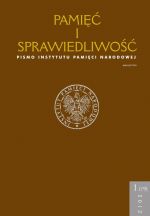Losy funkcjonariuszy policji II Rzeczypospolitej Polskiej w Polsce Ludowej
Fortunes of Police functionaries of the Second Republic in the period of the People’s Republic of Poland
Author(s): Marcin KaniaSubject(s): History, Recent History (1900 till today), Post-War period (1950 - 1989)
Published by: Instytut Pamięci Narodowej
Keywords: Police force; Civic Militia (Milicja Obywatelska, MO); security apparatus; political repressions
Summary/Abstract: In 1939, the Police force of the Second Republic of Poland ceased to exist. No political option, be it associated with the legal Government-in-Exile, be it Soviet-backed, anticipated reactivating the security organs in a reborn Poland in their pre-war form. For those who survived World War Two (less than 50% of the police force personnel of the Second Republic), difficult times arrived. Pre-war functionaries were subjected to a special “rehabilitation procedure” to verify their past in the pre-war period and the Occupation, at which successive instructions in this regard, issued in further years, were increasingly restrictive, affecting not only policemen, but their families as well. An issue apart is the story of a group of about 800–1000 policemen who were hired by the newly established Civic Militia (Milicja Obywatelska, MO). Their situation, at least in the early period, was better than that of their colleagues. The communist authorities were forced by reality to use their skills and experience, as they did not have professionals at disposal. Many former policemen were removed from the MO in two waves, in 1946 and 1947. Only a few – with particular qualifications – remained until 1949 (when they were definitely dismissed from theMO). Policemen who concealed their past and joined the UB (Security Bureau),were exceptions. Simultaneously from the very beginning, security organs carried out operations against the representatives of pre-war law enforcement services. The Ministry ofPublic Security issued special instructions on repressive activities against former policemen. Many were imprisoned, then sentenced to death or long prison terms. Especially harsh treatment was reserved for functionaries actively involved in undeground pro-independence activities during the Occupation, people like e.g. Bolesław Kontrym “Żmudzin”, whose pre-war police service was “priced” at 10 years of prison; his wartime activity was qualified as deserving the death penalty. The changes of 1956 weakened the repression, nevertheless the group in question remained under scrutiny by SB (Security Service) actually until the veryend of the People’s Republic of Poland. Also, the families of policemen were among the most discriminated social groups, as the mere fact of being a member of the family of a pre-war policeman was compromising throughout the period of communist rule in Poland.
Journal: Pamięć i Sprawiedliwość.
- Issue Year: 19/2012
- Issue No: 1
- Page Range: 421-451
- Page Count: 32
- Language: Polish

